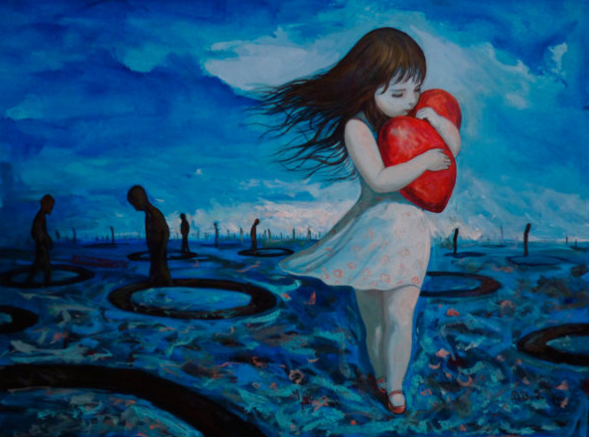
Courage is a product of the heart. It refers to the ability to be comfortable with uncertainty and grapple with the a fear of vulnerability. Nowhere is our courage tested more than in the realm of intimate connections. That’s why one of the bravest things we can do is to love another and receive their love in return. Learn the root causes of a fear of vulnerability and how you can begin to love from a place of courage. (Estimated reading time: 7 minutes)
“We cultivate love when we allow our most vulnerable and powerful selves to be deeply seen and known.”
— Dr. Brené Brown
Courage is a word that has held great importance throughout history. The word courage comes from the Old French word “corage,” which means heart and innermost feeling. In Latin, “cor” translates to inner strength.
Over the years, the word “courage” took on a masculine quality and became associated with men who fought in battles and carried out heroic acts that typically required physical strength. However, as time went by and our society changed, and the definition has expanded.
Courage is now seen as a product of the heart. It refers to the ability to be comfortable with uncertainty and grapple with the unknowns and the gray areas. It’s also about accepting our vulnerability, flaws, and imperfections – the very things that make us whole.
Nowhere is our courage tested more than in the realm of intimate relationships – where we’re required to remove our masks and allow ourselves to be seen by someone whose opinion matters to us. It’s in not knowing whether we will be hurt, judged, or left behind.
A real connection can only happen when we show courage and deal with our fear of vulnerability. That’s why one of the bravest things we can do is to love another and receive their love in return.
Once bitten, twice shy: why we’re afraid to love

The fear of vulnerability has its roots in our primal fear of abandonment and rejection. In his book, “Practical Intelligence: The Art & Science of Common Sense,” Dr. Karl Albrecht writes that our strong need to belong goes back to the caveman days when, if an early human were kicked out of his tribe, he would likely die.
Dr. Albrecht describes this feeling as “a loss of connectedness; of becoming a non-person—not wanted, respected, or valued by anyone else.” We perceive this as a threat to our well-being and survival. Not surprisingly, relationships of all kinds (intimate ones in particular) trigger this deeply embedded fear.
Whenever we reach the point where a relationship moves to the next level of intimacy, we worry if we’re giving our hearts to the right person. Will they treat us with the care, respect, and kindness we deserve? Will they treasure the deeply personal aspect of our persona that only a few ever get to see?
It becomes even harder to trust another and reveal the more vulnerable parts of us every time we’re disappointed. Whether a relationship ends, or we’re ghosted by someone we had high hopes for, it leaves a dark residue in our heart space, which stays there unless it’s dealt with healthily. In some cases, where trauma and abuse are involved, the damage is more acute and entrenched.
Our upbringing also plays into our fears of loving another. Most people don’t remember the emotional and psychological dynamic that played out with their caregivers.
The dynamic we had with our caregivers is lodged deep in our psyche, in obscure corners of our subconscious minds, yet our attachment style significantly impacts our adult lives. It’s vital to be aware of it. Many of the fears, behavioral patterns, and beliefs we demonstrate as grown-ups come from those first few years of life.
Analyzing our early attachments is especially important if we have an anxious or avoidant attachment style. Anxious attachment styles make us stressed and worried in our relationships, whereas avoidant attachment styles can influence us to be closed-off, unavailable, and indifferent in relationships.
As adults, we can’t change the past, nor should we sit around blaming our parents. Instead, we can become aware of the attachment style that has resulted from our upbringing and take steps to heal. In this way, we realize that love takes courage and overcome any fear of vulnerability.
Reframing love: an experience to be cherished

Being in love and loving unconditionally is one of the greatest gifts of life. It’s not easy, by any means, but choosing to face the hazards that come along with it is an act of courage. Even if we get some scrapes and bruises along the way, it will ultimately make us a person of wisdom.
When we see our quest for truth as a gift, we’ll realize that we benefit, no matter what happens with another person. Every step brings us closer to the force of universal love if we’re only willing to find the gift in our experiences – even the most hurtful ones.
As spiritual leader and author Marianne Williamson writes in her book, “A Return to Love,” “Love is the essential reality and our purpose on earth. To be consciously aware of it, to experience love in ourselves and others is the meaning of life. Meaning does not lie in things. Meaning lies in us.”
The outcome of connection shouldn’t be what matters most. It can be frustrating when you’re continually facing roadblocks in love, especially if you’ve been looking for Mr. or Ms. Right for a while, but the trick is to have faith in the process and see value in every connection.
No matter how sour it turned out, focusing on what you gained from a relationship puts you in the driver’s seat. Instead of playing the victim, you can take charge of your experiences. By removing the bitterness, your bonds with others become more enjoyable.
Like everything else in life, there is duality in love. Love sometimes has happy moments and occasionally hurtful ones. It’s both simple and complex. It makes us aware of both our light and dark sides. It’s sometimes easy to love and, other times, a challenge.
Accepting this duality will reveal that love is a balancing act that requires patience, commitment, and care – like the kind that we show towards a young sapling. If we want it to grow into a sturdy tree with strong roots, we need to nurture it, both in the good and bad times.
No matter how many people let you down, remember that you displayed courage every time you risked something for love and overcame your fear of vulnerability. It made you more human. It made you more alive. Most importantly, it brought you closer to the holiness of your soul.
As Rumi once said, “A lifetime without love is of no account. Love is the water of life. Drink it down with heart and soul!”
Loving fearlessly: developing a “soft front and strong back”

To love another with an open heart doesn’t mean that we should throw caution to the wind and wear our hearts on our sleeves. Neither does it imply that we should give up our standards. We can still be discerning about who we allow into our personal space.
Vulnerability is a balancing act – we must be both brave and afraid, excited and scared, tough and tender, all at the same time. We must display what Zen teacher Joan Halifax calls “a strong back and soft front.” He describes it as “the brave, tender ground in which to deeply root our caring.”
Metaphorically speaking, if we strengthen our backs and develop a sturdy yet flexible spine, it’ll be easier for us to have a front that’s open, soft, and loving. Learn why love takes courage and how to love fearlessly with these four ideas:
1. Develop self-love and trust: Self-love is not just a cliché but a truth. Before we can open up to another person, we must be comfortable in our own skins. Unless we feel strong inside, we won’t be able to deal with disappointment and fear. When we believe in ourselves, we are less likely to be needy, clingy, and dependent on others to make us feel worthy.
2. Choose wisely: It’s safer to be open with certain types of people than with others. While you can never predict the future behavior of another person, you can increase your odds of being with someone who will provide the assurance you need. There are certain patterns and traits you should be looking for before deciding whether you can feel safe with a prospective partner.
3. Set boundaries: When you first start seeing someone, the idea of setting healthy boundaries might slip your mind. Setting clear boundaries in the early stages is healthy and prevents you from getting caught up in your emotions. Whether you need emotional, physical, or financial boundaries, talking about what you need with the other person is a great way to make sure that you are both on the same page
4. Love from a place of detachment: The concept of detached love comes from the Buddhist practice of detachment, which emphasizes that by letting go of our need to be attached to anything – our feelings, thoughts, or an outcome – we liberate ourselves. Loving detachment means becoming less emotionally hooked on a connection by not forgetting ourselves and our priorities before we met that person. In this way, we can love from a place of strength.
Loving someone deeply feels like a leap of faith. There are no guarantees or prophecies that can offer comfort. We’ll be tested, and we will be hurt. That’s why to love another is an act of courage. But it’s better than closing ourselves off from love out of fear. In the end, love takes courage – taking the risk to experience the kind of love that’s transformative and enduring is always worth it.
All my best on your journey,
Seline

Question for you: Do you experience a fear of vulnerability in your intimate relationships and how do you overcome it? Do you believe that love takes courage?
Did you like this post? Sign up below, and I’ll send you more awesome posts like this every week.

Loved your article. Thank you
Ian
Lots of really good points made here! Thank you for sharing. I really enjoy reading content like this that challenges the reader and gives new things to think about and consider in normal every day life. Thanks for this and I look forward to reading more content from you soon. Think I am falling in love with this blog!
Thank you Romana!
Hello
Vulnerability has me trapped. Most articles I have read say speak to someone you trust. That would be great but I don’t have anyone I trust that much. So because I feel so vulnerable I also don’t believe love is real, I have felt like I experienced loving someone. Being vulnerable comes with the fear of initiating conversations about any thing and initiating things to do or intimacy.
I don’t think I have any frame of reference in interpersonal relationships, so I pretty much do everything on my own. Any projects I figure out ways not to ask for help. Not asking means I don’t have to explain or speak to some one else. I really do not like answering questions, that’s a little personal.
How do I get over this fear?